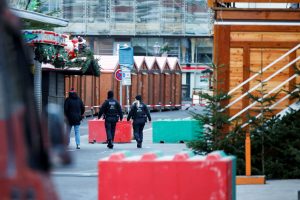TEL AVIV—Hamas officials are in Cairo Sunday aiming to reach a deal in the next 48 hours that would see the release of hostages in exchange for a temporary cease-fire in Gaza, according to Egyptian officials, a push to stop the fighting before the Muslim holy month of Ramadan.
Negotiators believe Hamas and Israel are close to being able to strike a deal over the next few days, Egyptian officials said. Key issues have yet to be fully agreed upon, including which hostages and which prisoners would be released.
Even if the two negotiating teams can agree, another major challenge remains: Hamas’s leader in Gaza, Yahya Sinwar , hasn’t been in contact for at least a week, raising concerns that the man who can implement a deal won’t be reachable, Egyptian and Qatari officials say.
Israel is also refraining from sending its senior negotiating team to Cairo until it receives a list of hostages Hamas knows are alive and can be handed over in the event of a deal.
“I demand to know in advance the names of all the hostages who will be included in the outline,” Israeli Prime Minister Benjamin Netanyahu said in a Thursday news conference.
Hamas is slated to hand over such a list on a Sunday, while Israel is meant to present a list of prisoners it will refuse to release, such as those convicted of planning or taking part in major terrorist attacks, Egyptian officials said.
Israel gave Hamas a Ramadan deadline to return hostages held in Gaza or face a ground offensive in Rafah, a town on the border with Egypt where more than million displaced Gazans are currently seeking shelter. Ramadan, which begins this year around March 10, in recent years has been a flashpoint for violence in Israel and the Palestinian territories.
The last message sent to Hamas political leadership in Qatar from Sinwar said there should be no rush to secure a hostage deal, said people familiar with the discussions. They said Sinwar was hoping that an Israeli incursion over Ramadan would push Palestinians living in Israel and the West Bank to rise up against Israel .
Adding to the urgency for all sides to strike a deal is the need to stave off potential famine inside Gaza, where the level of humanitarian aid able to be distributed across the enclave has plummeted due to the intensity of the conflict and widespread lawlessness , as well as by Israeli inspections at two land-border crossings.
Up to 15 children in Gaza have died from dehydration and malnutrition in recent days in northern Gaza’s Kamal Adwan Hospital, Gaza’s health ministry said on Sunday. The ministry said six more children who were being treated for malnutrition and dehydration were in danger due to a lack of resources and electricity at the hospital.
Benny Gantz , a leading political rival to Netanyahu who is also a minister in Israel’s war cabinet , is slated to land Sunday in Washington, where he plans to meet on Monday with Vice President Kamala Harris and national security adviser Jake Sullivan.
Gantz will discuss the issue of aid deliveries into Gaza as well as push the U.S. administration to pressure Hamas to accept the framework for a hostage release and temporary cease-fire deal that was agreed to by Israel during talks in Paris late in February.
The growing humanitarian crisis and lack of aid has garnered worldwide attention after a deadly aid-delivery attempt on Thursday in which Gaza health authorities say more than 100 Palestinians were killed.
On Sunday, Rear Adm. Daniel Hagari, the Israeli military’s chief spokesperson, said that a military probe concluded that the majority of the Palestinians were killed or injured due to trampling in a chaotic scene around the trucks holding the aid. Hagari said Israeli forces had opened fire at several individuals who had threateningly approached a group of soldiers who had already retreated from the aid convoy.
An Israeli military official previously said an initial estimate found Israeli soldiers killed fewer than 10 Palestinians who had approached Israeli forces.
Palestinian doctors say that many in the crowd were wounded by gunfire. Israeli officials say Palestinian gunmen also fired into the crowd, resulting in deaths.
On Saturday, three U.S. military aircraft dropped 38,000 ready-to-eat meals over southwestern Gaza, in an initial attempt to address a woeful shortage of food in the strip. The Jordanian air force released two airdrops of food over northern Gaza in what the U.S. termed a joint mission. The Israeli military said 21 airdrops have been coordinated as of Sunday.
Gantz’s trip to Washington underscores the tensions between Israel’s wartime leadership as the cabinet prepares to make important decisions over the hostage negotiations and the future of the war.
Gantz only informed Netanyahu of the trip on Friday, after the agenda was set, according to an official familiar with the matter. Netanyahu was surprised by and “borderline angry” about the initiative, the official said.
The public division of Israel’s leadership also comes amid increasing domestic unrest inside Israel.
On Saturday night, thousands of protesters swarmed into Jerusalem at the end of a four-day march from an Israeli town near Gaza, demanding Netanyahu strike a deal for the release of the hostages. In Tel Aviv, thousands of protesters also demanded elections and the resignation of Netanyahu.
Israel has significantly drawn down its forces inside Gaza over recent weeks, but the fighting continues to spread.
The Israeli military on Sunday announced it had carried out an “extensive series of strikes” in areas of southwestern Khan Younis, the city in Gaza’s south where the majority of the fighting in the strip has been taking place in recent months and where Israel believed Hamas’s leadership has been hiding. The airstrikes precipitated a movement of ground forces into the area.
Israeli officials have declined to comment on whether they believe Sinwar is still in Khan Younis.
The war in Gaza began with Hamas’s Oct. 7 attack on southern Israel , which killed about 1,200 people, according to Israel. Israel responded with bombing and a ground operation that have killed more than 30,000 people in Gaza, mostly women and children, according to Palestinian health authorities, whose figures don’t distinguish between civilians and militants.
— Adam Chamseddine contributed to this article.
Write to Summer Said at summer.said@wsj.com and Dov Lieber at dov.lieber@wsj.com


